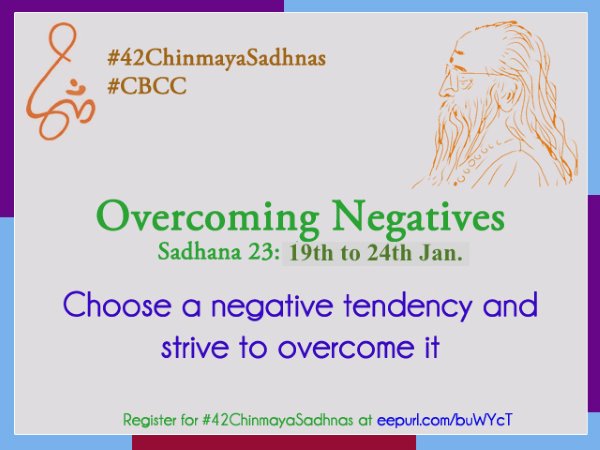Sadhana for Week 23
Mind Level: Overcoming Negatives
Choose a negative tendency and strive to overcome it.

Quote:
Desire, anger and their numberless children of sin and sorrow
Breed in the marshy lands of our own deluded intellect.
To remain under their sway is ignorance.
To rule over them is perfection.
Anecdote 1 (ego):
Once during the preparation of bhiksha at a camp there were many westerners as well an Indian. Naturally the Indian devotee was the natural choice as the expert and assumed the role of an incharge for preparing the meal.
About an hour prior to the bhiksha, some Indian ladies came into the kitchen to make tea for PoojyaGurudev. Soon they got themselves involved in the preparation of the bhiksha as well! There was a lot of tension in the kitchen between the two sets of cooks. Somehow the meal was prepared.
Finally the meal was served to PoojyaGurudev. Despite the long hours of work and the unexpected and unasked for culinary advise the meal looked good to the Indian devotee who was supervising the meal preparation from the beginning. Everyone was expectantly waiting for PoojyaGurudev to start eating and maybe receive a few words of appreciation for the meal.
PoojyaGurudev appeared to be subdued tonight, a far cry from his usual exuberant self – until a devotee from a nearby town appeared with a covered vessel in his hands and said, “Swamiji, I have brought you aviyal (a specialty from his home state Kerela). May I serve you some?”
“Of course!” was the exuberant reply.
Throughout the entire meal PoojyaGurudev praised theat single dish several times, asking for additional helpings of the same. Not a word was said about the meal that had been labored over for hours.
PoojyaGurudev used every opportunity to guide the seekers to end their ego and egocentric desires. Sometimes the lessons were not-so-subtle. When he saw that their hearts were closed and the minds were filled with negatives he turned his usual enthusiasm to cold indifference.
Anecdote 2 (attachment):
For one of the yagnas a particular devotee had assumed the responsibility of taking care of PoojyaGurudev’s footstool, his slippers, and cane at the end of each lecture. She would place herself unconstructively next to where PoojyaGurudev was sitting and move the foot stool, place his slippers in front of his feet and hand him his cane.
One night another woman took her spot. When the time came to help PoojyaGurudev, to remove the foot stool her said to herself, “Don’t worry. The other lady will help PoojyaGurudev today.” But her rational mind didn’t listen to herself and she got up, took position in front of the other lady and got ready to move the foot stool.
PoojyaGurudev stood up, she took the foot stool away, placed the chappals before him and handed him this cane. Instead of walking off the stage, he sat back on chair and said very loudly so that all in the hall could hear, “If I had remained standing she would have taken my chair also!”
After that on several occasions PoojyaGurudev repeated the same line in her presence, “If I had remained standing she would have taken my chair also!” just to make sure the devotee understood that attachment had no place in any kind of work including serving the Guru.
Anecdote 3 (anger):
A devotee asked PoojyaGurudev how he could overcome his bouts of anger. He sincerely wanted to get rid of this as he had realized how much sorrow and harm they caused him and others around him.
“Show me the anger in you, please” requested PoojyaGurudev. “There are some varieties that can’t be cured. Show me your type.”
“Right now I can’t show you, Swamiji. It comes suddenly and makes me do stupid things, and then just as suddenly leaves me,” explained the devotee.
“Then it is not your own nature. If it were so, you could show it to me. You were not born with a bad temper; nobody gave it to you; your education didn’t train you in it. It is not yours. Please think this over and come to disown it –quickly!”
What are negativities?
What is harmful to oneself and harms others. Which has destructive effect on us. Selfishness, Anger, Greed, Delusion, Intoxication, Jealousy are the 6 negative tendencies that a human mind has. They are called 6 vikaars or Shad-ripus. 6 enemies of the mind which destroy our peace and happiness.
We have to consciously work on overcoming these.
How to?
1. Identify the negative tendency
The most important step is to identify and acknowledge that this particular habit or trait is something that you want to remove or reduce in your personality.
Identify one such negativity. It can be any of the 6 mentioned above or anything else like procrastination or not being punctual or gossiping etc.
If any justifications are there, then the weakness continues to stay in us. Eg. If we justify that our jealousy is justified or because of traffic we are not punctual, it continues in us.
2. Feel its harm.
Feel the harm that it causes, by reflecting on it. Psychology says if you can feel it, you can heel it. Don’t run away from the negativity or suppress it. Go through it and feel its limitations and pain that it causes. Resolve that you want to work on it consciously and free yourself from it.
The will to overcome it is very important and it comes when one sees the pain of the negativity and how it holds us back from our goal or happiness.
3. Ways to overcome
Depending upon the intensity, the negativity can be overcome by any one of the following, through self effort:
a. Support:
When one is under the impulse of a negativity, one needs to hold on to a support system so that one is not carried away by the impulse and one does not land up acting in a harmful way. The support can be any of the following:
i. Breath: Make the breathing deeper and focus on every inhalation & exhalation
ii. Mantra: chant a mantra loudly/mentally. Chant it fast and synchronize the breathing, chanting and walking(if possible).
iii. Om shantihshantihshantih: repeat this to yourself and invoke peace
iv. Any other supports like counting from 50 to 1, diverting your mind to your goal or your work or anything else that you look forward to etc. will also help to control the impulsiveness.
Once the initial impulse is averted, then the deeper cause must be identified and overcome
b. Love:
Lack of self-love & self-respect is also the cause of many negativities. When we don’t love ourselves, we keep finding fault with ourselves and feel inadequate or incompetent.
“Incompetency in life generally springs from our false and hasty conclusions that we are impotent, insignificant and ineffective.” - Sw.Chinmayananda
Love yourself. Accept yourself as you are. These are the foundations for any growth, self-improvement and evolution. Its not complacency.
c. Identify and overcome Attachment:
Attachment is the root cause of each negativity. One must identify what one is attached to, which is causing this negativity. Eg. Being attached to sleep one is not able to get up early in the morning and one is affected by regret and guilt later. If one sees the pain of the pleasure that the attachment brings and sees the pleasure of the pain that self-effort brings, one can in time overcome the attachment. This is pratipakshabhavana.
d. Substitute:
Substitute negative with positive. Selfishness with selflessness.Anger with compassion.Greed with contentment.Delusion with clarity.Intoxication with Humility and Jealousy with Admiration. Every negativity is nothing but the positive emotion taken to the negative extreme. By strengthening the positive, the negative gets weakened automatically.
e. Surrender
Anger, greed, lust – just surrender it, not surrender to it! Surrender it to the feet of the Lord, if one has full faith in the Lord. For example every time you get angry, picture yourself at the feet of the Lord offering away the anger to HIM. Initially it will be very difficult to even picture the Lord, gradually you will be able to do it. Slowly you will feel the episodes of anger will become less intense and you will also not get agitated very often.
f. Uninvolved Observation
Detach yourself from it and observe the play of the weakness. Do not indulge or encourage it. Do not shun it. Merely observe it. This is the most difficult thing to do. But if one is able to do it, one will see the causes for the negativity to be there, how it operates in us, what strengthens it and how it goes.
Benefits:
1. Pure Mind & positive attitude.
2. Reduces attachment, hence less sorrow and dependency
3. Develop self control and strong will power
4. Improves self esteem
5. Develop selflessness
6. Gain more self confidence
7. More effective at work, less energy dissipation
8. Memory is enhanced, one is more focused
9. Creativity is increased
10. Develop equanimity and inner poise
11. Physical well being
Beginners and Advanced:
Beginners:
1. Begin with Step 1 - Evaluate yourself and decide which negative tendency you want to overcome the most. Decide and be convinced of it.
2. Follow Step 2 and feel the harm the negativity does. Reflect on it.
3. Follow Step 3 and practice impulse control through a support.
4. If you are successful in impulse control, practice any other ways to overcome the negativity
Advanced seeker:
Along with the beginners’ steps, practice uninvolved observation of the negativity.
.jpg)
UNTO HIM OUR BEST


